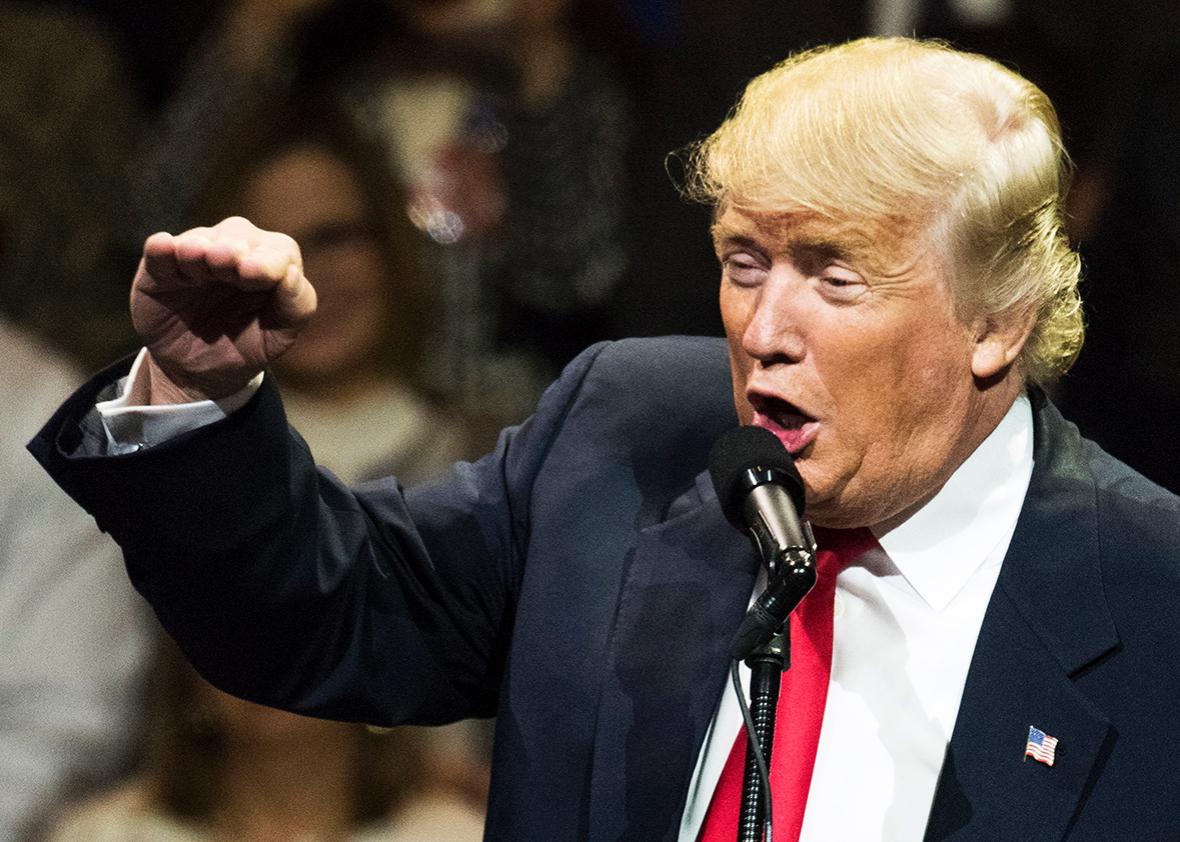At his first “thank you” rally in Cincinnati on Thursday, President-elect Donald Trump raced through some anemic calls for unity before mocking ABC’s Martha Raddatz for weeping on election night. “How about when a major anchor who hosted a debate started crying when she realized that we won? How about that?” he gloated. His voice thickened with fake sobs as he mimicked Raddatz’s supposed breakdown: “No, tell me this isn’t true.”
This was the first, but not last, indication on Thursday that Trump has a strange way of saying thank you. American presidents do not typically taunt their constituents or incite crowds to laugh at an individual’s tears (especially when those tears may have been the product of oppo fan fiction). They do not exhaustively run through the play by play of their electoral victories when the hard work of transitioning, learning, and crafting policy remains to be done.
But Donald Trump is not a typical U.S. president. Anyone hopeful that this man of mercurial allegiances and unpredictable whims might sober into a conventional politician (or at least one as hungry for broad approval as he is electrified by drama) saw her fantasies drowned out by hour upon hour of Trumpian self-congratulation, first at the Carrier air conditioning factory in Indianapolis and then at the rally in Ohio.
“You are the movement,” Trump shouted during the rally, foregrounding the importance of his supporters. “I’m the messenger. I’ve been a pretty good messenger!” he said, waiting nearly a full sentence before nudging the spotlight back toward his own face. The message, he said, was a cry of “anger” against politicians who “didn’t know what the hell they were doing”—who refused to “put America first.”
Tears, rage, exultation: Trump gives free rein to his moods and revels in channeling and indulging the moods of his supporters. For the president-elect, feeling is more important than governing. He loves being nice, and he loves being mean, and he loves being both in quick succession. During a campaign rally, he cooed at an infant in the crowd; then, his face darkening, he demanded that the mother “get that baby out of here.” His thank yous can be a prelude to viciousness, as when, at the Carrier plant, he dismissed an audience member’s kid while ostensibly praising him: “Your son, whoever the hell your son is, these people owe him a lot.” This is the unpredictability of a Roman emperor, a man who shouted, “You’re fired!” with the same brio as the Queen of Hearts’ “Off with her head!”
Consider the moment when Trump, addressing his roomful of Indiana factory workers, admitted he hadn’t intended to keep those Carrier jobs from going to Mexico. The president-elect explained he’d been watching the nightly news—“I won’t say which one because I don’t want to give them credit”—when a “gentleman worker, a great guy, handsome guy” had invoked a promise Trump made on the campaign trail. Trump, the Carrier employee insisted, had vowed to keep the Indianapolis factory open. This was apparently news to Trump, who confided to his audience, “I never thought I made that promise—not with Carrier. … I made it for everybody else.” But moved by the worker’s faith in him, PEOTUS picked up the phone and bent United Technologies CEO Greg Hayes to his freshly minted resolution.
From the perspective of traditional image management, Trump’s remarks were baffling. Why would he volunteer that he had no intention of keeping his campaign promise? Why would he chuckle over his inability to even remember the pledges he’d offered? Because Trump is not George W. Bush with his “Mission Accomplished” banner or Obama with his beer summit. He has no interest in traditional optics, which is to say that his speeches and postures don’t fit into a narrative he’s trying to craft, one that paints him as a trustworthy public servant or inspiring leader. Trump wants to put on a show, to optimize public utterance for maximum drama. It’s insane to think that Trump intervened in Carrier’s crisis at the last minute, on a whim, because of something he saw on TV. But it sure is exciting.
It’s exciting, yes, but it’s also very, very powerful. Trump is so terrific and important that he can descend upon a business like Zeus upon the mortals. “I alone can fix it,” he said at the Republican National Convention in July. I alone am fixing it, he said on Thursday. He is America’s capricious kingmaker, the impish, omnipotent ringmaster of a grand circus in which he’s taming CEOs and the liberal media and Mexico and Mitt Romney and lions—big, beautiful lions—in all five rings simultaneously.
The changing weather of Donald Trump’s temperament and his thrilling and sinister ability to enact his fitful will—these are the themes of a mass entertainment that has taken the place of traditional presidential politics. “One of the announcers, I have to tell you, from ESPN,” Trump told his followers on Thursday night, “he said, ‘That was the most exciting event I’ve ever seen.’ ” Every time Trump injects chaos into the system or subverts our expectations, he makes the spectacle better, and America worse.
